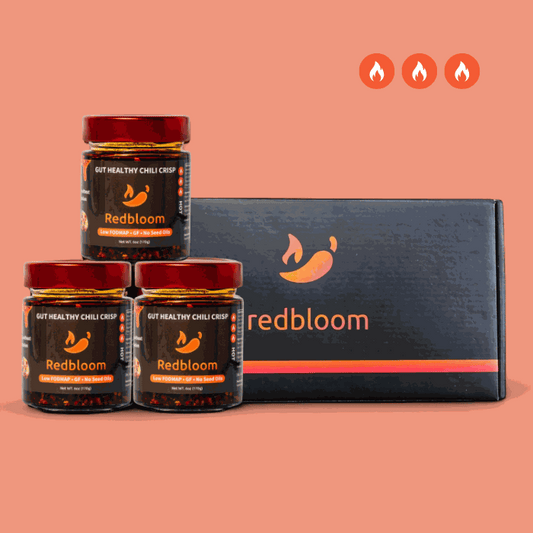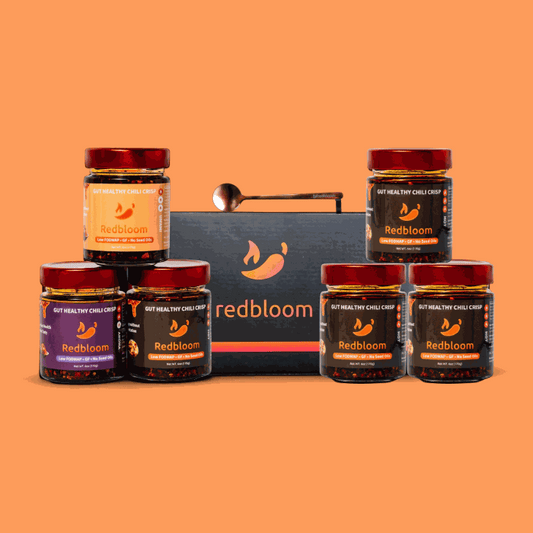Introduction
Whether you’re drizzling chili oil on dumplings or tossing your favorite spicy stir-fry, the type of oil you choose matters—especially for your gut. While avocado oil is gaining popularity in health circles, seed oils remain the default in many processed foods and condiments. But what’s the real difference between the two?
This article breaks down the contrasting profiles of seed oils and avocado oil, focusing on inflammation, gut health, and how these oils behave in spicy condiments like chili crisp. We’ll cover everything from omega-6 overload to oil processing and give you clear guidance on what to look for if you have a sensitive stomach or inflammatory issues.
What Are Seed Oils?
Seed oils are made from the seeds of plants, commonly including:
-
Soybean oil
-
Canola oil
-
Sunflower oil
-
Corn oil
-
Safflower oil
-
Grapeseed oil
They’re cheap, shelf-stable, and often used in processed foods and fast-food frying oils. But despite their ubiquity, they’re not ideal for gut or whole-body health.
The Problem with Omega-6 Fatty Acids
Seed oils are high in omega-6 polyunsaturated fatty acids (PUFAs), particularly linoleic acid. While omega-6s are essential in small amounts, Western diets often have a 20:1 omega-6 to omega-3 ratio, when a healthier balance would be closer to 4:1 or 1:1 [6].
An excess of omega-6s:
-
Promotes chronic inflammation
-
Triggers oxidative stress
-
Disrupts gut lining and microbiome balance
-
Is linked to IBS flare-ups, bloating, and systemic inflammation [6][8]
How Are Seed Oils Made?
Seed oils are often heavily refined, involving:
-
High heat
-
Chemical solvents like hexane
-
Bleaching and deodorizing
This process can destroy antioxidants and create harmful oxidation byproducts, further aggravating gut sensitivity and inflammation [4][6].
Avocado Oil: The Gut-Friendly Alternative
Made from the flesh of the avocado fruit, avocado oil is rich in:
-
Monounsaturated fats (especially oleic acid)
-
Vitamin E
-
Lutein and carotenoids
-
Antioxidants [1][2]
Anti-Inflammatory Benefits
Oleic acid has been shown to:
-
Lower inflammatory markers like CRP
-
Support a healthy gut barrier
-
Reduce oxidative stress in gut tissues [3][5]
Cold-Pressed and Unrefined
Avocado oil is often cold-pressed, preserving its natural nutrients without harsh chemicals or heat. This minimally processed oil is ideal for:
-
Cooking at high heat
-
Infusing with chili or garlic
-
Using in gut-safe condiments [2][5]
Seed Oils vs. Avocado Oil: Gut Health Comparison
| Feature | Seed Oils | Avocado Oil |
|---|---|---|
| Main Fat Type | Polyunsaturated (omega-6 heavy) | Monounsaturated (oleic acid) |
| Omega-6 Content | Very high (pro-inflammatory) | Low, balanced with omega-3s |
| Processing | Heavily refined, chemical solvents | Usually cold-pressed, minimally processed |
| Inflammatory Impact | Promotes inflammation and gut stress | Anti-inflammatory, gut-supportive |
| Common Use in Foods | Chili crisp, chips, sauces, fast food | Healthier chili oils, dressings, stir-fry |
The Gut Impact of Omega-6 Overload
Excess omega-6s, especially from seed oils, are linked to:
-
Increased intestinal permeability ("leaky gut")
-
Elevated gut inflammation
-
Changes in microbiota composition
-
Exacerbation of IBS and IBD symptoms [6][8]
By contrast, switching to monounsaturated fats like those in avocado oil may reduce bloating, soothe flare-ups, and support a more balanced gut environment [3].
What This Means for Spicy Condiments
Many chili oils and chili crisps are made with cheap seed oils, like soybean or sunflower oil. These may taste good, but they could be fueling your gut issues.
Chili Oil Checklist for Gut Health:
✅ Avocado or olive oil base
✅ Cold-pressed or expeller-pressed
✅ No preservatives or artificial flavors
✅ No added seed oils (soy, corn, etc.)
Avoid products that list:
-
Soybean oil
-
Canola oil
-
“Vegetable oil” (a catch-all term often hiding inflammatory fats) [7]
FAQs
1. Are all seed oils bad?
Not inherently, but excessive intake, especially in processed foods, creates an omega-6 imbalance that promotes inflammation [6].
2. Can I cook with avocado oil?
Yes! It has a high smoke point and retains its nutrients even when heated, making it perfect for frying, roasting, or chili oil infusions [2].
3. What about olive oil?
Also a great option. Like avocado oil, it’s rich in monounsaturated fats and antioxidants, though it has a slightly lower smoke point [1].
4. Is sunflower oil better if it's labeled “high oleic”?
Yes, high-oleic sunflower oil has a healthier fat profile—but it’s still less nutrient-dense than avocado oil [3].
5. Does seed oil always cause digestive symptoms?
Not for everyone, but people with IBS, IBD, or sensitive digestion may notice flare-ups or bloating when eating foods cooked in seed oils [8].
Conclusion
The next time you pick up a jar of chili crisp or drizzle oil on your dinner, check the label. Your gut will thank you. Avocado oil offers a cleaner, anti-inflammatory, gut-supportive alternative to heavily processed seed oils. When it comes to digestion, inflammation, and overall health, the difference is real—and it starts with what’s in your pantry.
Citations
-
https://snackjacksons.com/blogs/blog/is-avocado-oil-a-seed-oil
-
https://www.coraltreecafe.com/posts/benefits-of-avocado-oil-risks-of-seed-oil
-
https://sunnywithin.com/blogs/the-bright-spot/avocado-oil-vs-seed-oil
-
https://www.allrecipes.com/article/cooking-oils-anti-inflammatory-diet/
-
https://www.washingtonpost.com/wellness/2025/03/07/healthiest-oil-seed-oils-bad/





